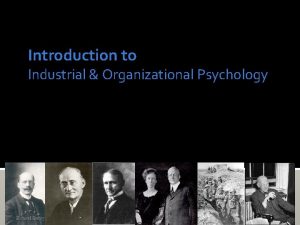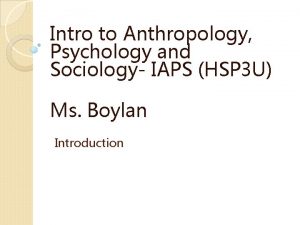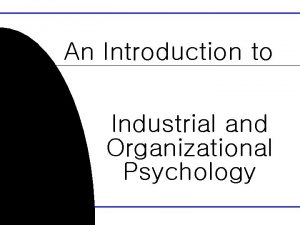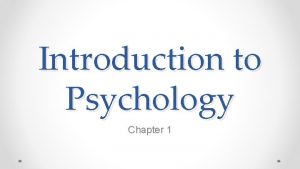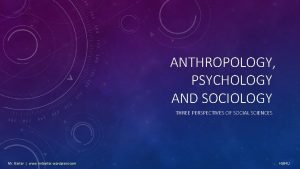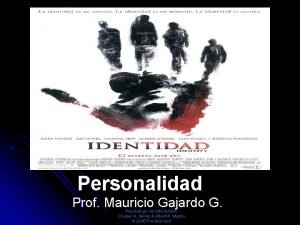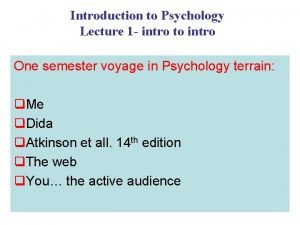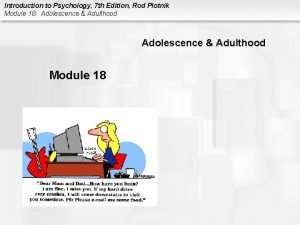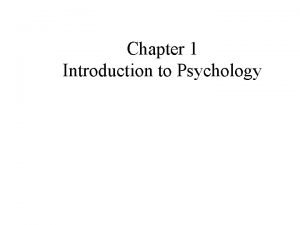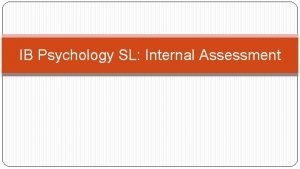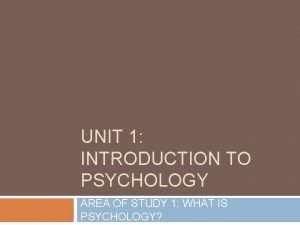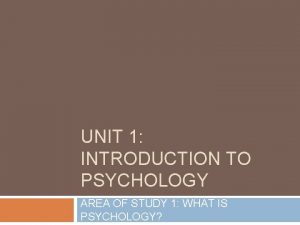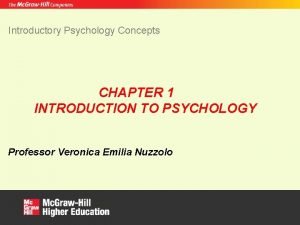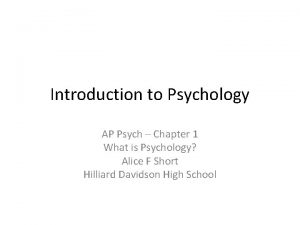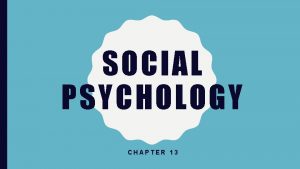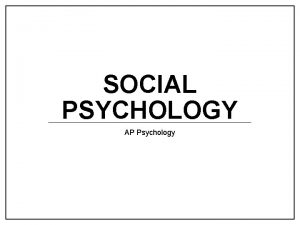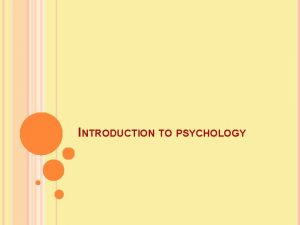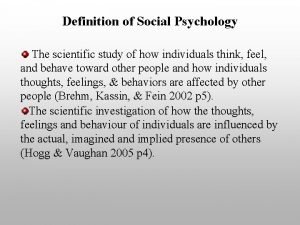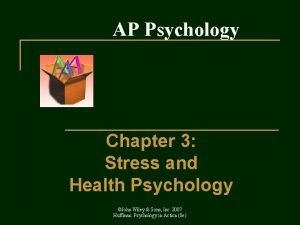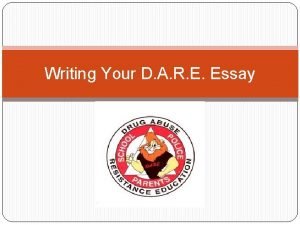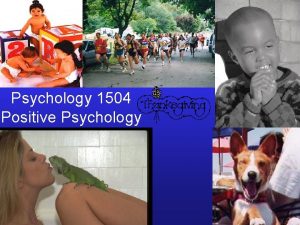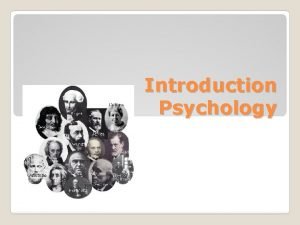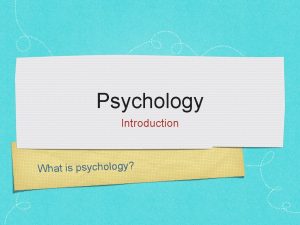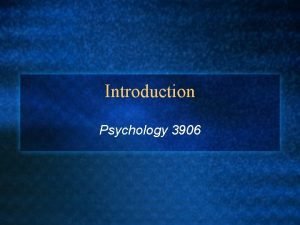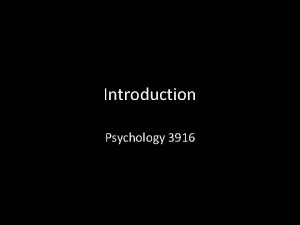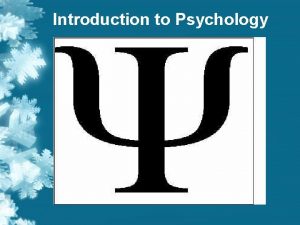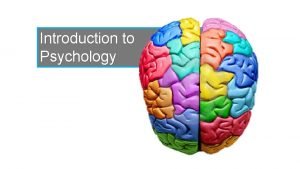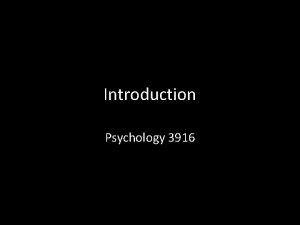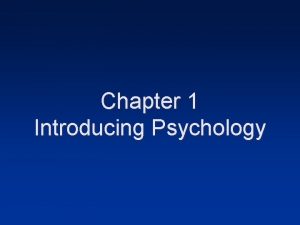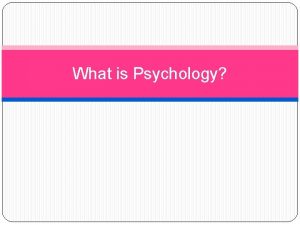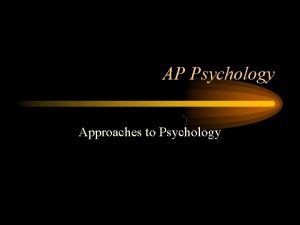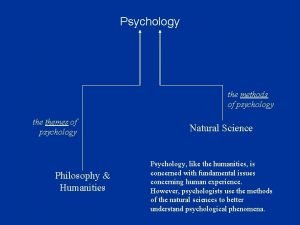Introduction to Psychology What is Psychology Psychology is
































- Slides: 32

Introduction to Psychology

What is Psychology? • Psychology is the scientific study of behavior and mental processes – Mental processes: Internal, subjective experiences we infer from behavior • Examples: thoughts, dreams, perceptions, sensations, beliefs or feelings – Behavior: Anything an organism does. Behavior is observable • Examples: smiling, yelling blinking, sweating talking

How does Psychology relate to Science? • Psychology is a social science, but still a SCIENCE – Psychologists use the scientific method – Scientific Method: Process of gaining knowledge by identifying problems, forming hypothesis, and then testing hypothesis with observation, experimentation and analysis

What do Psychologists Do? • Careers in Psychology – Clinical Psychologists make up the largest % of psychologists (48%) – Many Psychologists become counselors (11%) – Most who earn doctoral degrees become researchers (5%) – Other Fields: school, industrial, organizational, social and personality, developmental, health, etc… – Two major Psychology organizations are: • American Psychological Association • Association for Psychological Science

What are the Origins of Psychology? • Greek Philosophers – Socrates and Plato first conceive the mind as separate and distinct from the body • Enlightenment Philosophers – Rene Descartes: early ideas of the nervous system – John Locke develops Blank Slate Theory: men are shaped by experience, not predisposition – Locke and Francis Bacon come up with empiricism • Empiricism: idea that knowledge and science should rely on observation and experimentation

How was Psychology Born? • William Wundt, a German professor, created an experiment to measure difference between people hearing a ball drop and pressing a lever (1879) – Experiment designed to measure lag in the nervous system – Wundt is considered the father of psychology

How was Psychology Born • Edward Bradford Titchener, Wundt’s student, develops idea of Structuralism (1892) – Structuralism: Theorized an elemental structure of human mind exists; “building blocks” of human thoughts • Used introspection (looking within)… subjects report elements of conscious experience as they perceive them • Influenced by scientific ideas on atoms and molecules

How Was Psychology Born? • Gestalt psychology: idea that the whole (sum of all the parts) is more important than the individual parts – Basically a rejection of structuralism – Mostly German Why do you perceive a white triangle and not 3 black pac-man circles?

How Was Psychology Born • William James, Harvard professor, develops Functionalism – Functionalism: school of psychology focused on how mental and behavioral processes function, and how they are adaptive • James theorized that behaviors and thoughts must be useful and contribute to survival • Influenced by Charles Darwin and Herbert Spencer’s idea on natural selection and evolution – Considered father of American Psychology – Published the first Psychology Textbook

Psychodynamic

Psychodynamic • Focuses on? – Personality development • What is behavior determined by? – Tensions generated by unconscious motives, current conflicts and unresolved childhood conflict (many sexual). Most thought processes occur unconsciously • Key Terms: – Conscious: thoughts and feelings we’re aware of – Preconscious: Area of mind holding information that is not conscious, but is retrievable – Unconscious: Region of mind that is reservoir of mostly unacceptable thoughts, wishes, feelings, memories

• Sigmund Freud: father of psychodynamic perspective. 3 levels of consciousness. Many thought processes occur unconsciously – Ego: largely conscious “executive” part of personality. Mediates between demands of ID, and standards of Superego – Superego: Internalized ideals, standards for judgments – ID: unconscious, aggressive, sexual energy, located in subconscious


Freudian Defense Mechanisms • Sigmund Freud: Defense Mechanisms 1. 2. 3. 4. 5. 6. Repression: forgetting anxiety producing feelings Regression: Anxious person retreats to more comfortable stage of life Denial: anxious person refuses to admit something is happening Reaction formation: reverses an unacceptable impulse Projection: Attributing anxiety causing feelings to something else Rationalization: Gives comfortable explanations to anxiety causing actions 7. Displacement: Redirects an impulse onto a substitute target 8. Sublimation: Transforms an unacceptable impulse into a socially acceptable form

• "Give me a dozen healthy infants, well-formed, and my own specified world to bring them up in and I'll guarantee to take any one at random and train him to become any type of specialist I might select–doctor, lawyer, artist– regardless of his talents, penchants, tendencies, abilities, vocations and race of his ancestors” –John B. Watson

Behavioral • What is the focus? – Behavior! Everything should be observable, testable. Our behavior is shaped by learning from past experience • What is behavior determined by? – Experience • Rewards • Consequences • Verbal cues • We are products of all past events and experiences: Behavior + Reactions of people around us + consequences = future behavior

Behavioral (Important People) • Ivan Pavlov (1849 -1936) – Pavlov’s Dog: taught a dog to salivate in response to bell – Classical Conditioning: learning by association – Office Example Ivan Pavlov

Behavioral (Important People) • Edward Thorndike (1874 -1949) – Puzzle Box: Animals learn how to get out based on past experiences, increasingly fast – Conclusion: All animals learn the same way • John Watson (1878 -1958) – Little Albert Experiment: conditioned child to be afraid of white rat by using loud noise – Little Albert video – Father of Behaviorism • Authored Psychology as the Behaviorist Views it John B. Watson

Behavioral (Important People) • B. F. Skinner (1904): Behavior changes according to reward or punishment – Negative and Positive Reinforcement (behavior rewarded with candy = more likely to behave in same way) – Skinner Video • Albert Bandura (1925 - ) Social Learning Theory – People learn by seeing what goes right and wrong for others • Bobo Doll Experiment: children learn violent behavior by observation

Humanistic • What is the focus? – Individuals’ freedom to choose and capacity for personal growth – Humans are inherently good • What is behavior determined by? – Free will / self-actualization – Self Concept (image of oneself) • • Ideal self: what we want to be Actual self: what we are The more ideal = actual, the more we exercise free will Individuals have ultimate free will to decide own behavior

Humanistic (Important People and Beliefs) • Carl Rogers – Conscious experience is proper focus of psychology – Humans growth and free will is achieved by being: • Accepting (unconditional positive regard) • Genuine (freely express feelings, open about selves) • Empathetic (sharing thoughts and feelings with others) Carl Rogers

Humanistic (Important People and Beliefs) • Abraham Maslow: self-actualization is ultimate psychological need – Self-Actualization: All basic physical and psychological needs are met and self-esteem is achieved; motivated to achieve potential – Developed Maslow’s Hierarchy of Needs (lower on pyramid you are, the less free will you can exercise) Abraham Maslow

Maslow’s Hierarchy of Needs


Cognitive • What is the Focus? – How mental processes affect decision making and thus behavior • What is behavior determine by? – Ability to make rational decisions through thought processes • Conversation with self • The way that brain makes decisions (memory, thinking, learning) • “Information Processing”: brain like a computer – Strongly tied to neuroscience

Cognitive (Important People) • Jean Piaget – Studied children and how thinking develops – Children think differently, not just less powerfully – Development occurs in stages Jean Piaget

Biological • What is the Focus? – The brain, nervous & endocrine systems, and how they impact behavior • What is behavior determined by? – The brain and other physiological systems – Highly influenced by heredity / birth – Chemical imbalances (ADHD) • Any more? – Science, brain scanners used to study physical systems of brain and nervous system

Socio-Cultural • What is the Focus? – Everything about your identity • Ethnicity, race, culture, gender, socioeconomic status, societal expectations, family values, morals, friends • What is Behavior Determined by? – Your upbringing – The Situation: people you are surrounded by and setting

Socio-Cultural • Massillon Tigers Example

Socio-Cultural (Important People) • Philip Zimbardo (1933): Situations can cause people to do things they otherwise wouldn’t – Stanford Prison Experiment: College students who played guards were very cruel in a simulated prison

Socio-Cultural (Important People) • Stanley Milgram (1933 -1984): Influence of authority is important in determining behavior – Ran shock experiments where participants were asked to deliver shocks to others • 65% of participants were willing to deliver lethal shocks to strangers when asked by the white-coated “researcher” • People will do what authority asks, even when they know it’s wrong • Shock Experiment (3: 35)

Socio-Cultural (Important People) • Solomon Asch (1907 -1996): Influence of conformity and group influence – People will go along with the group, even when they know it’s wrong Which line is closest in length to the line at the left? Experiment Candid cam A B C
 Intro paragraph outline
Intro paragraph outline Introduction to organizational psychology
Introduction to organizational psychology Introduction to anthropology psychology and sociology
Introduction to anthropology psychology and sociology Introduction to industrial psychology
Introduction to industrial psychology Introduction to psychology chapter 1
Introduction to psychology chapter 1 Introduction to health psychology
Introduction to health psychology Introduction to forensic psychology bartol pdf
Introduction to forensic psychology bartol pdf Venn diagram of anthropology sociology and psychology
Venn diagram of anthropology sociology and psychology Introducción a la psicología psychology: an introduction
Introducción a la psicología psychology: an introduction Introduction to psychology lecture
Introduction to psychology lecture Introduction to psychology rod plotnik
Introduction to psychology rod plotnik What is anthropology
What is anthropology Introduction to psychology chapter 1
Introduction to psychology chapter 1 Ib psychology ia example
Ib psychology ia example Unit 1 introduction to psychology
Unit 1 introduction to psychology Unit 1 introduction to psychology
Unit 1 introduction to psychology Lumen introduction to psychology
Lumen introduction to psychology Psychology
Psychology Introduction to psychology chapter 1
Introduction to psychology chapter 1 Positive psychology ap psychology definition
Positive psychology ap psychology definition Group polarization example
Group polarization example Social psychology ap psychology
Social psychology ap psychology Introspection method in psychology
Introspection method in psychology Social psychology is the scientific study of
Social psychology is the scientific study of Health psychology definition ap psychology
Health psychology definition ap psychology Learning without burden was published in
Learning without burden was published in What is yacc
What is yacc How to start a dare essay
How to start a dare essay Example of academic writing
Example of academic writing Abstract vs introduction
Abstract vs introduction How long is a introduction
How long is a introduction Formal email introduction
Formal email introduction Introduction paragraph bridge
Introduction paragraph bridge

